WHAT ARE THE SIDE EFFECTS OF GABA?

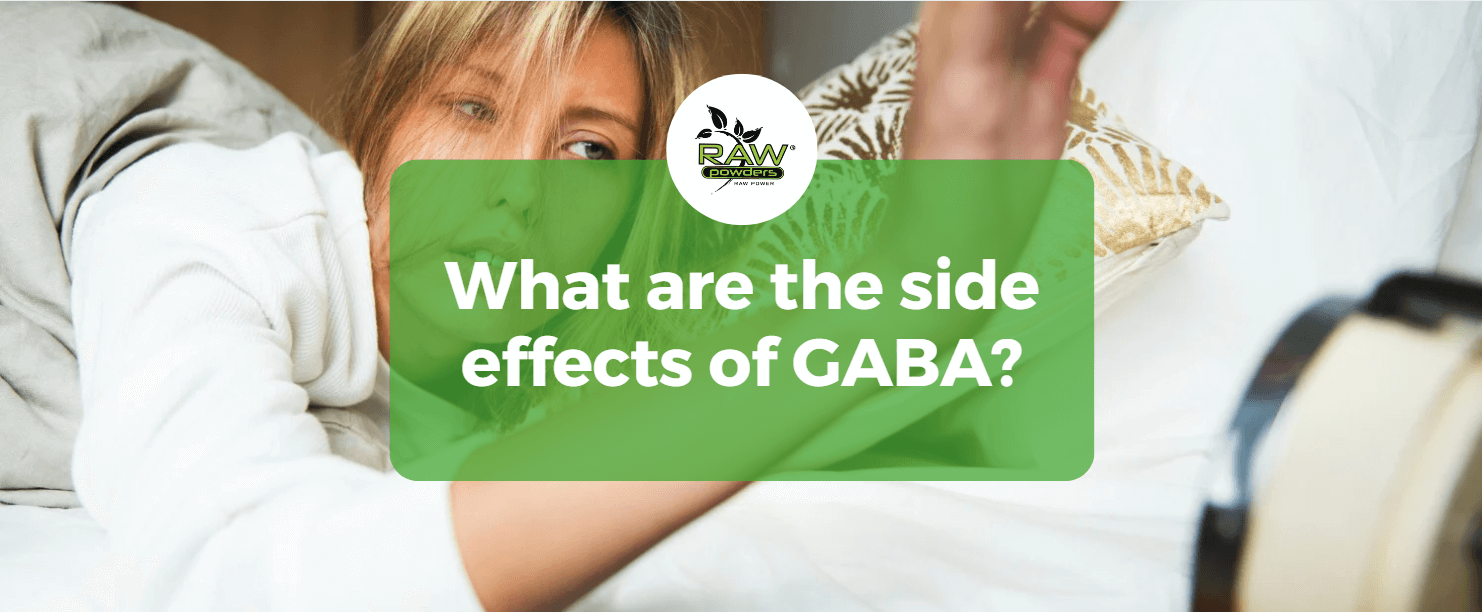
GABA supplements can cause side effects such as stomach upset, muscle cramps, facial tingling, numbness in the legs, drowsiness, headaches, and minor changes in heart rate. It is important to understand that GABA, as an endogenous amino acid, theoretically should not be harmful to health. However, as with any substance, there are some risks, especially when GABA is taken in higher than recommended doses or in combination with other medications.
For calming, relaxation and better sleep, the nootropic dietary supplement GABA might be a truly miraculous solution for many. It has a mild sedative and anti-anxiety effect and allows us to simply "switch off" when things get too much.
For more information on the effects and benefits of GABA on the human body, see the blog post GABA Benefits.
But what are the side effects and dangers of GABA? Is GABA addictive or is it detrimental to health in the long run? Our blog provides answers.
The potential side effects of GABA supplements have not been sufficiently studied, so it is difficult to know what to expect.
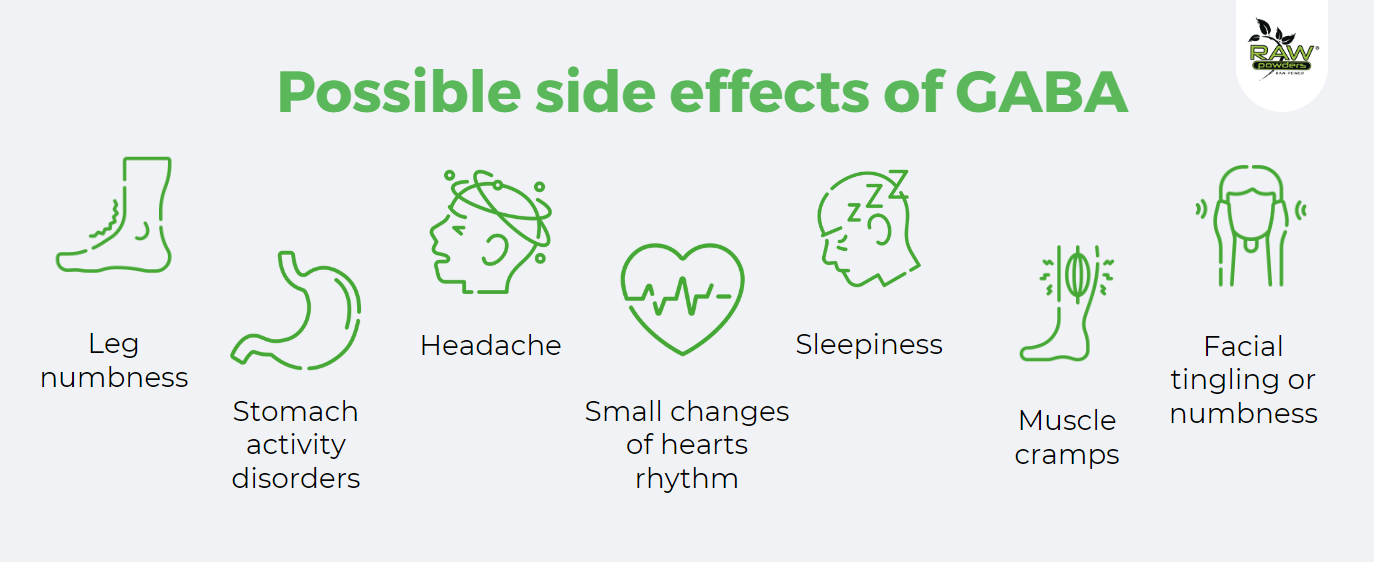
The most common side effects of GABA may include:
- Stomach upset
- Muscle cramps
- Facial tingling or numbness
- Numbness in the legs
- Minor changes in heart rate
- Drowsiness
- Headache
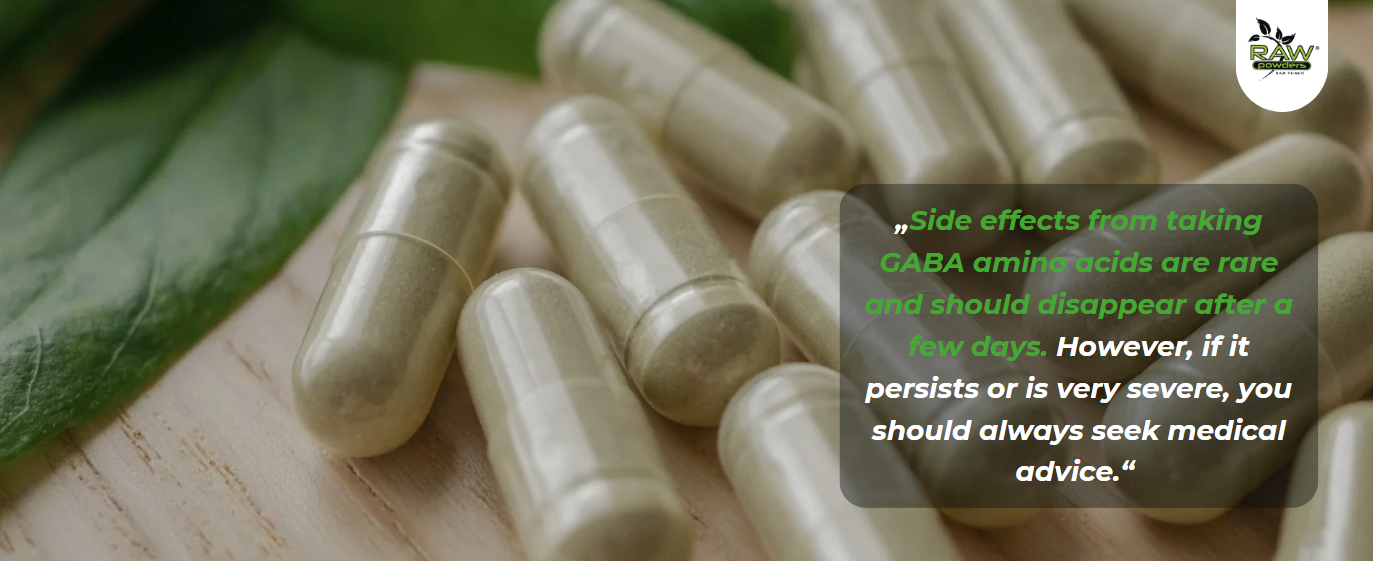
It is important to understand that GABA is not harmful to health - it is an endogenous amino acid. (You can read more about what GABA is here.) However, as with all medicines and dietary supplements, side effects may occur in certain cases. This is particularly important in the case of overdose or in combination with other medicines.
Side effects with GABA amino acids are rare and should disappear after a few days. However, if it persists or is very severe, you should always contact your doctor.
In addition, there is still a lack of reliable studies and research on the use of GABA during pregnancy and lactation.
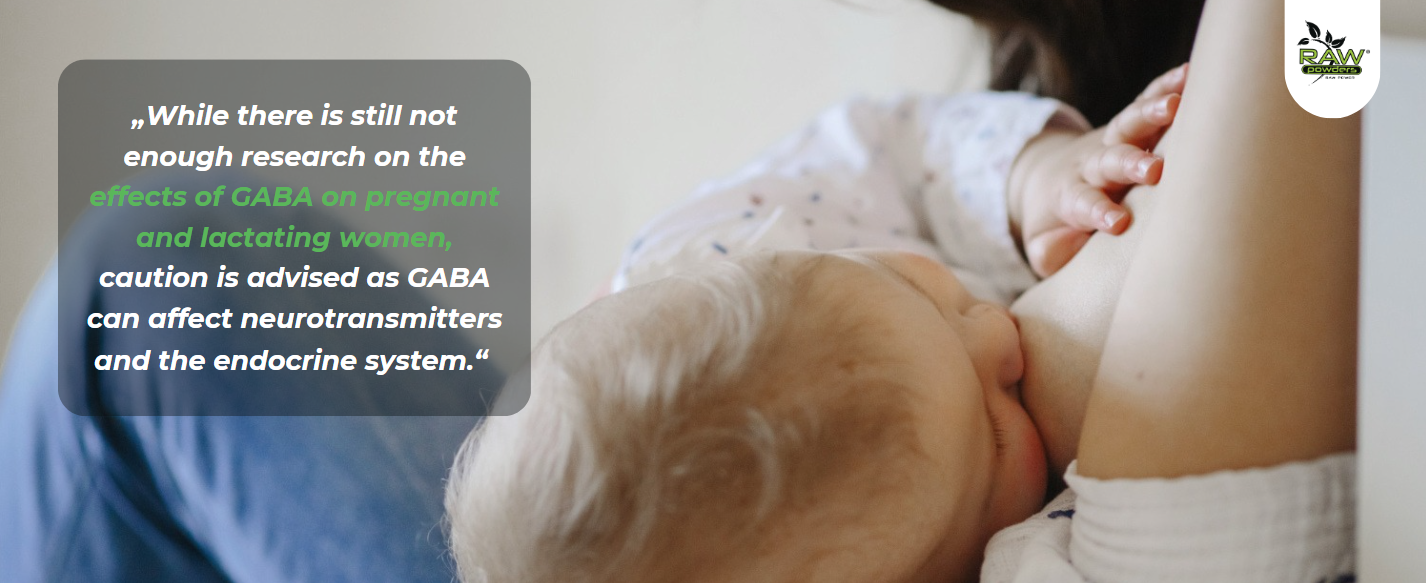
The caution advised for pregnant and lactating women due to potential effects on neurotransmitters and the endocrine system is grounded in the understanding that GABA plays significant roles in the body beyond its calming effects. Research into the safety and effects of GABA supplementation in these populations is lacking, suggesting a gap in the literature and a need for targeted studies.
This comprehensive review assessed the safety of GABA supplementation by evaluating clinical studies, adverse event information, and toxicology data. The review found no serious adverse events associated with GABA intakes up to 18 g/d for 4 days and in longer studies at intakes of 120 mg/d for 12 weeks. However, it noted that some studies associated GABA with a transient and moderate drop in blood pressure. No studies were available on the effects of GABA during pregnancy and lactation, underscoring a need for caution in these populations [1].
Therefore, nootropics such as GABA should not be used by breastfeeding and pregnant women.
When is it dangerous to take GABA?
First of all, as with all medicines and dietary supplements, you should always stick to the recommended dose. (For more information on the use and dosage of GABA, see here).
- Data showed no serious adverse events associated with GABA at intakes up to 18 g/d for 4 days and in longer studies at intakes of 120 mg/d for 12 weeks. Only a few participants reported a slight burning sensation in the throat immediately after taking GABA which ceased shortly thereafter. In some cases, the burning sensation was accompanied by brief shortness of breath.
Additionally, intake of 5 or 10 g daily for 4–5 days resulted in increases in immunoreactive insulin and glucagon, although no change in blood glucose level was observed. Acute toxicity studies of GABA in Sprague–Dawley rats at doses of 1000 mg/kg body weight determined a LD50 >1000 mg GABA/kg body weight. A 28-day study and a 90-day study in rats determined a no-observed-adverse-effect level (NOAEL) at 5 mg GABA/kg body weight per day, the highest dose tested.
Because some studies showed that GABA was associated with decreases in blood pressure (<10% change), it is conceivable that concurrent use of GABA with anti-hypertensive medications could increase risk of hypotension [1]. - Evidence from at least one clinical study shows that the bioavailability of GABA in the brain is improved significantly when taken concurrently with phosphatidylserine, and thus GABA may interact with medicines used to treat epilepsy [2].
- The oral administration of a mixture of GABA and L-theanine (100/20 mg/kg) to ICR mice was found to decrease sleep latency and prolong sleep duration compared to GABA or L- theanine treatment alone following an intraperitoneal injection with sodium pentobarbital. The authors concluded that GABA and L-theanine had a synergistic effect on the sleep behavior of mice. So it can interact with sleep supplements e.g. L-theanine [3].
GABA should only be taken at bedtime. Since the supplement has a mild sedative effect and promotes sleep, the risk of driving a car while taking GABA is naturally too high. The body's natural ability to react is often needed during the day, both at work and in traffic. Mental relaxation and rest are important to replenish energy reserves and to simply unwind. However, if you want to help your body relax with GABA, you need to be in a calm and safe environment, as the body's natural response to stimuli, including danger, is slowed down.
- The systematic review provides relevant insights into the sedative effects of GABA and its potential implications for bedtime administration. This review examines the impact of oral GABA intake on stress and sleep through a comprehensive analysis of placebo-controlled human trials. The findings indicate that while there is limited evidence supporting the stress-reducing benefits of GABA, its effects on enhancing sleep are also considered limited. The review suggests that GABA has a potential role in reducing sleep latency (the time it takes to fall asleep) and increasing total sleep time, particularly during non-REM sleep stages, which could justify recommendations for its intake at bedtime to aid in relaxation and sleep induction. However, the authors also note the need for more research to draw definitive conclusions regarding the efficacy of oral GABA consumption on stress and sleep [4].
- Additionally, another study directly investigates the effects of GABA on sleep patterns and its bioavailability after oral administration in humans. This research found that GABA significantly shortened sleep latency and increased total non-REM sleep time, suggesting that GABA supplementation can have a positive effect on sleep initiation and duration. These findings support the notion that GABA supplementation may be beneficial when taken at bedtime, particularly due to its sedative effects that promote sleep [5].
Together, these studies provide a scientific basis for the recommendation of GABA supplementation at bedtime, highlighting its potential to enhance sleep quality and reduce the time it takes to fall asleep. Nonetheless, as suggested by the systematic review, further research is needed to fully understand the scope of GABA's effects on sleep and to establish definitive guidelines for its use in promoting relaxation and sleep
When buying GABA you should make sure that you choose products of extremely high quality. Our advice: it is best to order GABA safely from online pharmacies or specialized nootropic suppliers.
Emphasizing the importance of choosing high-quality GABA products from reputable sources reflects concerns across dietary supplements, where variability in product quality can lead to differences in efficacy and safety.
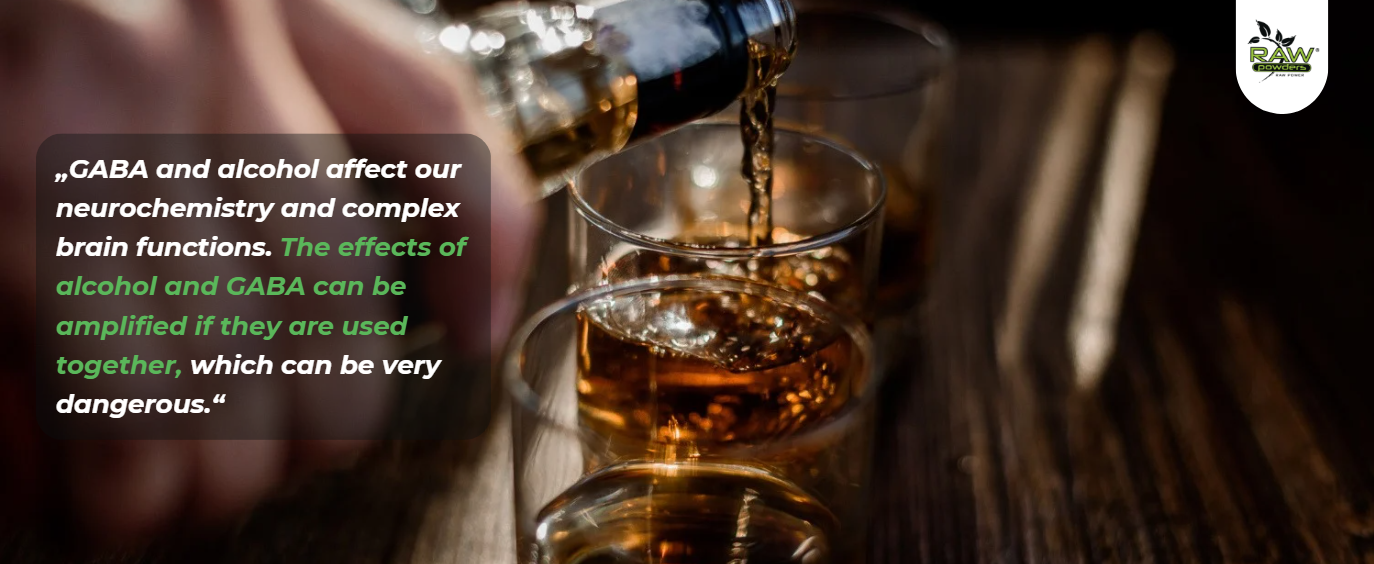
GABA and alcohol
The interaction between alcohol and GABA is complex. Firstly, their effects on the brain's neurotransmitters are similar. Both substances are relaxing, reduce anxiety and sometimes cause drowsiness. If both substances are used separately and in moderation, then (depending on the situation) most people should not experience any strong side effects.
Nevertheless, self-medication with GABA is by no means advisable. GABA and alcohol affect our neurochemistry and complex brain functions. The effects of alcohol and GABA can be amplified if they are used together, which can be very dangerous.
The interaction between alcohol (ethanol) and GABA (Gamma-aminobutyric acid), particularly through GABAA receptors, is a well-documented area of research that underscores the complex neurochemical basis of alcohol's effects on the brain. Here are some research articles that explore various aspects of the relationship between GABA, its receptors, and alcohol:
- Low dose acute alcohol effects on GABA A receptor subtypes: This study examines how low doses of ethanol interact with GABA(A) receptors, highlighting the selectivity of ethanol's action on different GABA(A)R subtypes, including extrasynaptic delta and beta3 subunit-containing GABA(A)Rs which are sensitive to low millimolar ethanol concentrations [6].
- Alcohol and GABA-benzodiazepine receptor function: This article delves into the electrophysiological, behavioral, and biochemical studies that implicate GABA(A)ergic synapse in the actions of alcohol, discussing how alcohol may enhance GABA-mediated responses in various neurons and its implications for alcohol's behavioral effects [7].
- High-affinity GABAA receptors and alcohol: The paper discusses the role of extrasynaptic GABAA receptors that mediate tonic inhibition in the central nervous system and their sensitivity to low concentrations of alcohol, proposing a mechanism for some of alcohol's effects [8].
- Ethanol increases GABAergic transmission at both pre- and postsynaptic sites in rat central amygdala neurons: This study provides evidence that ethanol can potentiate GABAergic synaptic currents in the central amygdala by acting at both presynaptic and postsynaptic sites, suggesting a neural substrate for some of ethanol's effects on behavior [9]
These studies collectively illustrate the multifaceted nature of alcohol's interaction with the GABAergic system, including its potential to modulate GABA receptor function directly and indirectly, as well as the varied responses depending on the receptor subtypes and neural context. The research underscores the complexity of alcohol's effects on the brain, mediated in part through its interactions with GABA and its receptors, which can influence a range of behaviors from relaxation and reduced anxiety to the risk of developing alcohol use disorders.
In addition, anxiety and panic disorders, addictions and sleep disorders are serious health issues. Neither GABA nor alcohol can solve the real cause, which should be addressed therapeutically and medically.
Therefore, the use of GABA and alcohol without medical supervision is not recommended under any circumstances.
The complex interaction between GABA and alcohol, especially their combined effects on neurochemistry, is a critical area for caution. Both substances influencing GABAergic signaling can amplify each other's effects, potentially leading to enhanced sedation or intoxication, underscoring the need for caution when used concurrently.
GABA, a crucial chemical messenger in our body, plays a pivotal role in managing our neurological health. Yet, the effectiveness of GABA as a dietary supplement remains somewhat ambiguous. Research into its potential benefits has yielded some positive findings [4], for instance:
- A systematic review highlighted the comparative anxiolytic effect of GABA-modulating phytomedicines to pharmaceuticals, emphasizing their safety and tolerability [10]
- Similarly, studies have shown that oral administration of GABA can induce relaxation and reduce anxiety, suggesting its utility as a natural relaxant [11].
- Furthermore, research on GABA-rich fermented milk indicates that it might offer benefits for individuals suffering from insomnia and related symptoms, reinforcing GABA's potential as a sleep aid [12].
Despite these encouraging signs, it's crucial to note that many studies on GABA's effects are either small-scale or inconclusive, necessitating further investigation to fully grasp its supplementation benefits. While GABA supplements, readily available for online purchase, might offer a natWhile GABA supplements, readily available for online purchase, might offer a natural solution for managing stress, fatigue, anxiety, and insomnia, they should not be considered a panacea for more severe conditions such as profound anxiety, seizure disorders, or high blood pressure. As the quest to understand GABA's role in supplementation continues, it's advisable to approach its use with caution and not as a substitute for professional medical treatment.
Medical Disclaimer
The information provided in our articles is solely for educational purposes and should not be considered medical advice or instruction. No action or inaction should be taken based solely on the contents of this information. Readers should consult their health care professional on any matter related to their health and well-being. The information and opinions provided here are believed to be accurate and sound, based on the best judgment available to the authors, but readers who fail to consult with appropriate health authorities assume the risk of any injuries. The publisher is not responsible for errors or omissions.
Please be aware that different countries may have specific regulations and that this disclaimer does not replace the need for consultation with a healthcare provider before beginning or changing a treatment or supplement regimen. The information contained in this article is not intended to diagnose, treat, cure, or prevent any disease. Individual results may vary.
References
- Hellen A. Oketch-Rabah, Emily F. Madden, Amy L. Roe, Joseph M. Betz. United States Pharmacopeia (USP) Safety Review of Gamma-Aminobutyric Acid (GABA). Review: Nutrients. 2021 Aug 10;13(8):2742. doi: 10.3390/nu13082742. https://pubmed.ncbi.nlm.nih.gov/34444905/.
- Loeb, C., Benassi, E., Bo, G., Cocito, L., Maffini, M., & Scotto, P. (1987). Preliminary evaluation of the effect of GABA and phosphatidylserine in epileptic patients. Epilepsy Research, 1, 209-212. doi: 10.1016/0920-1211(87)90043-X. https://www.sciencedirect.com/science/article/abs/pii/092012118790043X?via%3Dihub
- Kim, S., Jo, K., Hong, K., Han, S., & Suh, H. (2019). GABA and l-theanine mixture decreases sleep latency and improves NREM sleep. Pharmaceutical Biology, 57, 65 - 73. doi: 10.1080/13880209.2018.1557698. https://www.tandfonline.com/doi/full/10.1080/13880209.2018.1557698
- Hepsomali, P., Groeger, J., Nishihira†, J., & Scholey, A. (2020). Effects of Oral Gamma-Aminobutyric Acid (GABA) Administration on Stress and Sleep in Humans: A Systematic Review. Frontiers in Neuroscience, 14. doi: 10.3389/fnins.2020.00923. https://www.frontiersin.org/journals/neuroscience/articles/10.3389/fnins.2020.00923/full
- Yamatsu, A., Yamashita, Y., Pandharipande, T., Maru, I., & Kim, M. (2016). Effect of oral γ-aminobutyric acid (GABA) administration on sleep and its absorption in humans. Food Science and Biotechnology, 25, 547-551. doi: 10.1007/s10068-016-0076-9. https://link.springer.com/article/10.1007/s10068-016-0076-9
- Wallner, M., Hanchar, H., & Olsen, R. (2006). Low dose acute alcohol effects on GABA A receptor subtypes.. Pharmacology & therapeutics, 112 2, 513-28. doi: org/10.1016/J.PHARMTHERA.2006.05.004. https://www.sciencedirect.com/science/article/abs/pii/S0163725806000908?via%3Dihub
- Ticku, M. (1990). Alcohol and GABA-benzodiazepine receptor function.. Annals of medicine, 22 4, 241-6 . doi: 10.3109/07853899009148934. https://www.tandfonline.com/doi/abs/10.3109/07853899009148934
- Lovinger, D., & Homanics, G. (2007). Tonic for what ails us? high-affinity GABAA receptors and alcohol.. Alcohol, 41 3, 139-43 . doi: 10.1016/J.ALCOHOL.2007.03.008. https://www.sciencedirect.com/science/article/abs/pii/S0741832907000596?via%3Dihub
- Roberto, M., Madamba, S., Moore, S., Tallent, M., & Siggins, G. (2003). Ethanol increases GABAergic transmission at both pre- and postsynaptic sites in rat central amygdala neurons. Proceedings of the National Academy of Sciences of the United States of America, 100, 2053 - 2058. doi: 10.1073/pnas.0437926100. https://www.pnas.org/doi/full/10.1073/pnas.0437926100
- Karen Savage, Joseph Firth, Con Stough, Jerome Sarris. GABA-modulating phytomedicines for anxiety: A systematic review of preclinical and clinical evidence. Review: Phytother Res. 2018 Jan;32(1):3-18. doi: 10.1002/ptr.5940. Epub 2017 Nov 23. https://pubmed.ncbi.nlm.nih.gov/29168225/
- Abdou, A., Higashiguchi, S., Horie, K., Kim, M., Hatta, H., & Yokogoshi, H. (2006). Relaxation and immunity enhancement effects of γ‐Aminobutyric acid (GABA) administration in humans. BioFactors, 26. doi: 10.1002/BIOF.5520260305. https://iubmb.onlinelibrary.wiley.com/doi/10.1002/biof.5520260305
- Yu, L., Han, X., Cen, S., Duan, H., Feng, S., Xue, Y., Tian, F., Zhao, J., Zhang, H., Zhai, Q., & Chen, W. (2020). Beneficial effect of GABA-rich fermented milk on insomnia involving regulation of gut microbiota.. Microbiological research, 233, 126409. doi: 10.1016/j.micres.2020.126409. https://www.sciencedirect.com/science/article/pii/S0944501319312212?via%3Dihub





_front%20(1)-250x250.png)



_front%20(1)-250x250.png)

-(NN)_front%20(1)-min-250x250.png)

_front%20(1)-250x250.png)


_front%20(1)-min-250x250.png)
_front%20(1)%20(1)-250x250.png)
_front%20(1)%20(1)-250x250.png)
_front%20(1)-min-250x250.png)
_front%20(1)-min-250x250.png)
_front%20(1)%20(1)-250x250.png)
_front%20(1)%20(1)-250x250.png)

-250x250.png)
_front-250x250.png)

